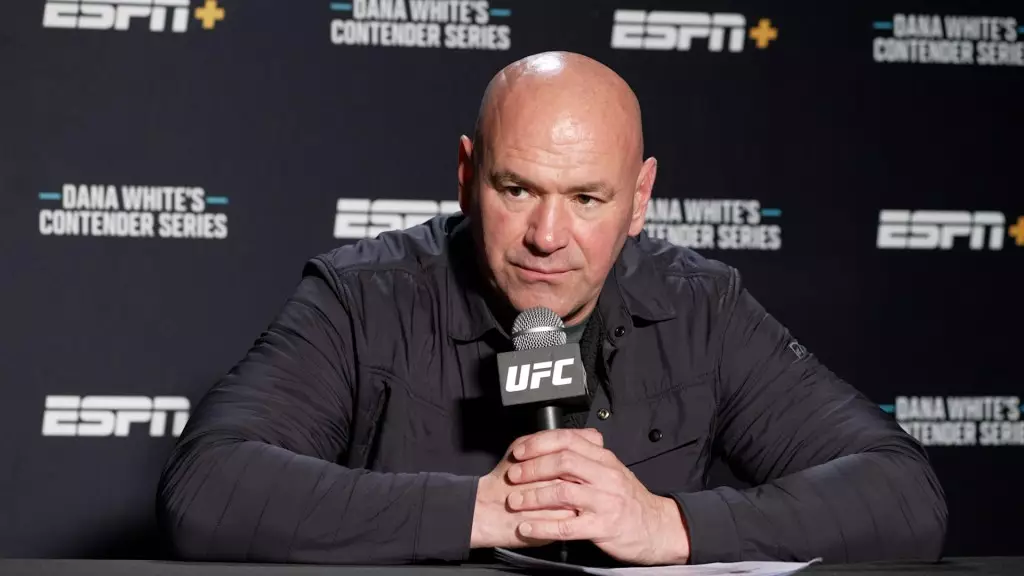Over the years, Dana White’s ambitions for expanding the UFC’s influence into the world of boxing have garnered widespread attention. Though vocal about his interest, recent developments indicate that there are considerable roadblocks not just from within the UFC, but also from the broader boxing landscape. This analysis will delve into White’s aspirations, the reactions from TKO Group Holdings, and the implications for the future of combat sports.
Dana White is known for his relentless pursuit of opportunities, often leading the UFC into uncharted territory in the sports world. Recently, he has made comments that have ignited speculation about whether the UFC would officially enter the boxing sphere. White has alluded to “big announcements” regarding boxing involvement, a bold claim that many enthusiasts have eagerly awaited. However, despite his charisma and knack for promotion, there is a palpable sense of ambiguity surrounding the execution of these ambitions.
In a recent Q&A session during a boxing fight broadcast on UFC Fight Pass, White reiterated his consistent track record of following through on his announcements, which adds a layer of credibility to his intentions. Yet, one must wonder if this commitment is met with equal enthusiasm from the UFC’s stakeholders. The apparent hesitation from the UFC ownership to wholly embrace boxing complicates the narrative. The dream of establishing a boxing arena from the successful MMA infrastructure has provoked both excitement and skepticism.
Mark Shapiro, president and CEO of TKO Group Holdings, shared illuminating remarks during a quarterly earnings call regarding White’s passion for boxing. His comments serve to temper expectations, suggesting that while White’s enthusiasm is admirable, it doesn’t necessarily align with TKO’s immediate strategic direction. This statement emphasizes the fragmented state of boxing—a sport believed by Shapiro to be rife with challenges, providing an unstable foundation for new ventures.
Shapiro’s assertion that White is a “best promoter” lends credence to his abilities, but there is an underlying caution. The reality that boxing needs revamping, as highlighted by Shapiro, parallels the issues that have plagued the sport for years. Fragmentation, disillusionment, and confusion dominate the boxing world, raising alarms about whether any new undertaking led by UFC could effectively address these issues or risk compounding them.
An interesting development from Shapiro’s remarks alludes to the strategy TKO would potentially adopt if they were to pursue boxing. Contrary to a traditional merger and acquisition model, TKO seems inclined to forge partnerships, indicating a collaborative approach to resource-sharing and cost management. Such a move could mitigate financial risks while still allowing them to tap into boxing’s potential growth market.
This partnership-centric strategy presents a double-edged sword; while it offers advantages in terms of resource pooling and expertise sharing, it also requires finding suitable partners with aligned goals. As seen in the past, alliances in combat sports can be unpredictable, and any misalignment could jeopardize the success of the endeavor.
While White’s aspirations may be hindered by organizational hesitations, his backing for emerging talents like Callum Walsh illustrates his commitment to nurturing talent in boxing. By supporting boxers with strong backgrounds, reminiscent of Conor McGregor’s rise in the MMA scene, White seeks to evoke a sense of optimism and future potential. However, producing viable talent does not necessarily equate to a successful boxing promotion.
The connection to Walsh represents a strategic move, yet it serves more as a personal endorsement than an organizational greenlight for boxing involvement. The success of an individual fighter, while promising, does not translate into the immediate feasibility of establishing a boxing division for the UFC.
With Dana White’s aspirations lingering at the intersection of enthusiasm and uncertainty, the future of boxing under the UFC umbrella remains speculative. The interest from both White and TKO Group Holdings is a hopeful sign, yet numerous challenges loom on the horizon. The fragmented landscape of boxing may present an attractive opportunity for growth, but it also requires careful navigation and strategic foresight. As combat sports continue to evolve, it remains to be seen whether Dana White’s boxing dreams will be realized or whether they will remain aspirational flights amid the broader complexities of the sport.

